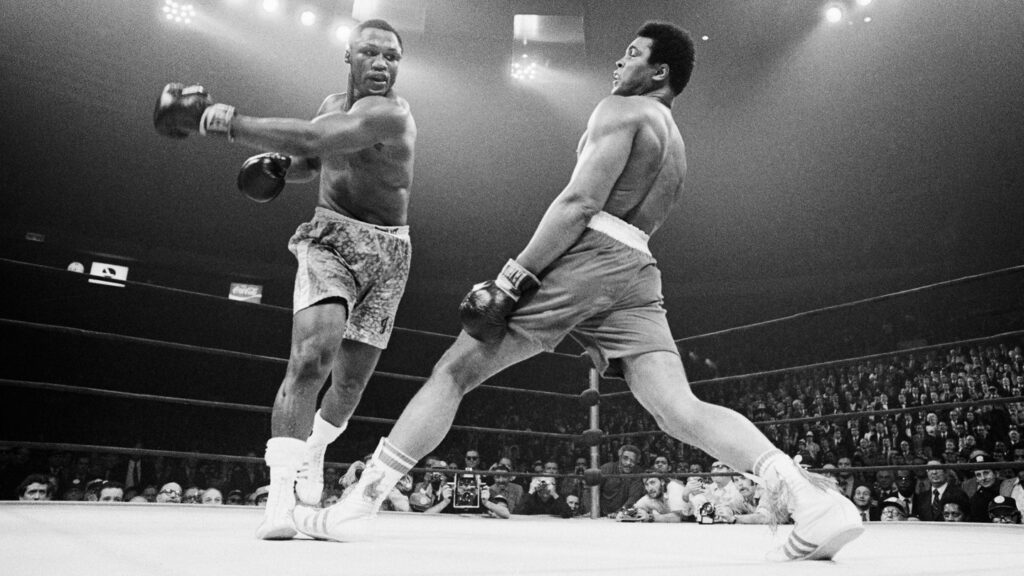‘Everything is given in the least punch…’
The photo shows the heavyweight title fight between Joe Frazier and Muhammad Ali at Madison Square Garden in 1971, which Frazier won.
To Marx the capitalist is a ‘personification’ of capital in at least two senses: first in the sense that what the actual capitalist does and doesn’t do only expresses the laws of motion of the wider system that Marx calls ‘capital’ or the accumulation of capital. Secondly, in the sense that it is ‘real capitals’ (actual capitalists) that execute the ‘will’ of capital and ‘realise’ those seemingly abstract laws of motion. (You can see how much more complicated things become when we move from capital to the state, which at one time Marx intended to do.) But ‘personification’ is a terrible word for what is actually at stake here. Marx is trying to convey something far more complex through the example of a literary trope.
Sartre’s ideas about ‘totalisation’ and ‘incarnation’ give us a deeper understanding of precisely these sets of relationships which Marx himself never lays out in an explicit or philosophical way. We can replace Marx’s ‘personification’ with Sartre’s ‘incarnation’. In vol. 2 of the Critique of Dialectical Reason he takes the example of boxing. What is fascinating in this analysis, sustained for over thirty pages, is not so much the argument that capitalism itself is expressed through boxing in the sense that boxing is an economic enterprise whose ‘entrepreneurs recruit their workers among the exploited only to subject them to another kind of exploitation’ and that the young boxer ‘sells even that rage which makes him so combative…’, so that an explosive, blind rage is disciplined and socialized by being commodified through the contract he signs with powerful promoters. What is fascinating is how Sartre makes boxing speak dialectically.
He tells us that ‘each fight is all of boxing’, implying a relationship between ‘each’ and ‘all’ that is already quite distinct from part & whole or instance & concept. He explains what he means by saying that ‘in every fight boxing is incarnated’ (p. 22). In other words, totality (the system, society, history, whatever we choose to call it; in this example the world of boxing and through it the economic enterprise that controls it) is only real in the immediacy of events and individuals, and that immediacy in turn means nothing except as a realisation (a concrete or actual unfolding in time) of totality.
Sartre’s word for this unfolding is ‘totalisation’. By ‘incarnation’ Sartre means totalisation in its immediacy; this fight here, this financial collapse of 2007, this suicide, and so on. Or, as he says in vol. 2, ‘incarnation is an individual form of totalization….by this we do not mean that it is the symbol or expression of [the whole which is being totalized], but that it realizes itself in a very real and practical sense as totality producing itself here and now’ (t. 2, p. 27).
The whole here and now! That’s probably the simplest way of expressing Sartre’s notion of what history is and what it means for it to happen. Events and individuals are indissolubly singular and universal, their singularity including not just where and when this fight is taking place but also, crucially, how it is fought down to the last detail. So when he says, ‘Everything is given in the least punch’, he means this literally – everything, ‘from the history of the one who delivers it’ (from the lives of Frazier and Ali) to the ‘material and collective circumstances of that history’ (growing up in a violent, racist society in the late forties and fifties); from the ‘enveloping totalization’ that is the ‘world’ of boxing, the economic enterprise controlled by boxing promoters, to the way Ali was trained and assumed that training as a life ‘project’ (to be ‘the best’); and so on. All of these ‘ensembles’ (partial totalities, totalisations) are condensed in this fight here, which in turn ‘retotalizes boxing and all other fights’.
He sums up this fascinating argument by saying: ‘The incarnation as such is at once unrealizable except as a totalization of everything, and irreducible to the pure abstract unity of what it totalizes’. Here, in a nutshell, is the dialectic in its pure definition, a sense of the real texture of history with its ‘perpetual reversal of perspectives’ that takes us from the movement of history to the individuals who make it and to the events they create or become involved in and then back again to the histories/ history they shape.
by Jairus Banaji

